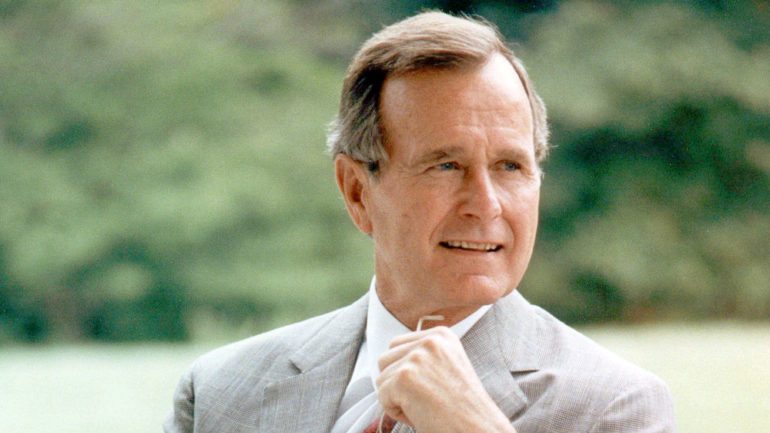Former President George H.W. Bush Dies at 94
By Dani Levy
LOS ANGELES (Variety.com) – Former President George H.W. Bush has died, his son, former president George W. Bush, announced Friday night. He was 94.
“Jeb, Nell, Marvin, Doro, and I are saddened to announce that after 94 remarkable years, our dear Dad has died,” said in a statement. “George H. W. Bush was a man of the highest character, and the best dad a son or daughter could ask for. The entire Bush family is deeply grateful for 41’s life and love, for the compassion of those who have cared and prayed for Dad, and for the condolences of our friends and fellow citizens.”
The lifelong politician served as the 41st President of the United States from 1989 through 1993 and was the father of 43rd President George W. Bush and Florida Governor John “Jeb” Bush.
His wife, Barbara, died April 17.
was played by James Cromwell in Oliver Stone’s “W.” about his son’s presidency.
The son of Senator Prescott Bush, George Herbert Walker Bush was born on June 12, 1924 in Milton, Mass. After enlisting in the armed forces on his 18th birthday, Bush become the youngest pilot in the entire Navy. During his service, Bush was awarded the Distinguished Flying Cross for bravery in action. His plane was shot down over Chichijima. He parachuted and was rescued from the ocean waters.
He served through the end of World War II, going on to study at Yale University and marrying Barbara Pierce in 1945. Together they had six children: George, Robin (who died as a child), Jeb, Neil, Marvin, and Dorothy. He and the family took up residence in West Texas and Bush entered the oil industry. By the age of 40, Bush had become a millionaire.
Shortly after founding his own oil company, Bush entered politics and served two terms as congressman. After two unsuccessful runs for senator, he sat in a variety of high-level positions: Ambassador to the United Nations, Chairman of the Republican National Committee, Chief of the U. S. Liaison Office in the People’s Republic of China, and Director of the Central Intelligence Agency.
Bush was nominated as Ronald Reagan’s running mate in the 1980 presidential election after losing to him in the primary. As vice president, Bush ran administrative task forces on deregulation and the War on Drugs.
But he was challenged in his own run for the White House in 1988, when he sought to pull off the rare feat of being a sitting vice president to win the presidency. As such, he ran a campaign that capitalized on the successes of the Reagan years while trying to play down some of its scandals, like the Iran-Contra affair. Bush famously promised a “kinder, gentler nation” at the Republican National Convention that year, but his fall campaign against the Democratic nominee, Michael Dukakis, was hardly all niceties.
With a double-digit deficit in the polls, Bush waged a relentless assault on Dukakis as a liberal out of the touch with the mainstream. Bush’s campaign manager, Lee Atwater, worked to taint Dukakis as soft on crime, particularly his support of a prison furlough program. An independent group backing Bush ran ads featuring Willie Horton, a convicted murderer who did not return from his furlough and raped a woman. Although the official Bush campaign did not run the ads, they did run a spot, “Revolving Door,” featuring men walking in and out of a prison facility. The combination of the campaign spots and the independent ads proved potent, and Bush’s poll numbers rose.
After winning the election handily, Bush was president during an enormous shift in the global order, including the fall of the Berlin Wall and the end of Soviet influence over Eastern Europe in 1989, and the collapse of the Soviet Union two years later. He sent forces into Panama to topple the country’s authoritarian ruler, Manuel Noriega, and then created the coalition of 32 nations to recapture Kuwait after it was invaded by Saddam Hussein’s forces from neighboring Iraq.
Bush appointed two judges to the Supreme Court, one of whom, Clarence Thomas, still serves.
Bush signed into law several landmark pieces of legislation, including the Americans with Disabilities Act and Clean Air Act. Bush also negotiated for the North American Free Trade Agreement, which was eventually signed into law by his successor, Bill Clinton.
Coming off the swift success in routing Iraqi forces from Kuwait, Bush enjoyed sky high poll numbers in 1991, and his re-election the following year looked to be all but a foregone conclusion. But the dynamics changed as the economy stumbled. An eight month recession that ended in March 1991 was followed by a lackluster recovery, as unemployment continued to rise.
Clinton capitalized on public discontent, as well as a divided Republican party. Bush in 1990 had reached a budget deal with a Democratic Congress that went back on a campaign promise — “read my lips: no new taxes.” Moreover, in the fall 1992 campaign, he also faced the independent candidacy of Ross Perot, who split the vote and helped tilt the election to Clinton.
During Bush’s second year in office, he founded the organization “Points of Light,” fostering volunteerism as a solution to societal problems. The organization and Bush’s other service work earned him the 2010 Presidential Medal of Freedom, affirming his message that citizens can be a “thousand points of light.”
While his presidency didn’t have the Hollywood pizzazz of his predecessor Reagan, a former actor, Bush did have a strong contact in Hollywood with close friend producer Jerry Weintraub. “No other man was as well-prepared for the presidency in the United States of America as George Bush. No other man,” Weintraub later told CNN.
The final World War II veteran to serve as president, Bush marked his birthdays with parachute jumps, even when he turned 90 and no longer had the use of his legs.

